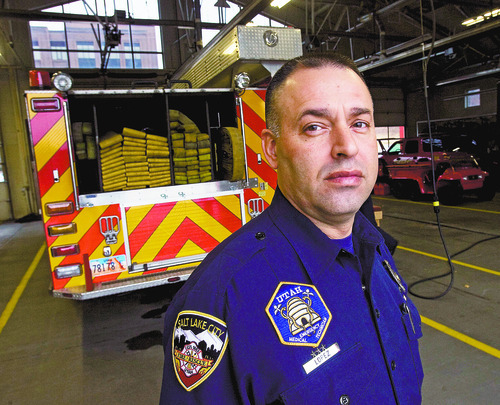This is an archived article that was published on sltrib.com in 2011, and information in the article may be outdated. It is provided only for personal research purposes and may not be reprinted.
Nick Lopez will do just about anything for an old Marine Corps buddy — even talking about wartime experiences he'd rather forget.
So when a former sergeant looking for veterans to interview as part of an oral-history project at the University of Utah called, Lopez was one of 33 veterans of this century's wars who agreed to share their stories.
The American West Center at the U. of U. has interviewed more than 500 veterans of World War II, plus smaller numbers from conflicts in Korea, Vietnam and Iraq, as part of the oral-history endeavor. But Matthew Basso, director of the American West Center and an Army vet, decided not to wait decades before recording oral histories from Utah vets returning from the latest wars in Iraq and Afghanistan.
"It's important," Basso said. "We don't believe Americans have a full sense of the complexities in the experience of war."
Lopez's oral history spans more than 25 years, from his enlistment in the Marines in 1984 to his retirement as a sergeant major in 2010. It includes combat deployments in the Persian Gulf and training operations around the world in locales such as Israel, Norway and Ukraine.
But the Sandy man's history also touches on the births of his children, on a painful divorce, on the deaths of friends and fellow servicemen, and even on complaints about day-to-day military operations. "I think every deployment shapes and changes your life," Lopez said. "Either for good or bad, sometimes both."
Lopez has plenty of great times he hopes to remember such as "skit nights" where young Marines would dress up and impersonate senior officers, or "Speckled Jim," his unit's chemical-detection pigeon who became their mascot despite his propensity for escaping. He also reflects on forging a superior officer's signature to get 97 cots for his Marines to sleep on, instead of the hot Kuwait tarmac, during Operation Desert Shield. That defense action was welcomed with flowers, candy and kindness by grateful Iraqis on the way into Baghdad in 2003.
The darker times are important too, even though Lopez would rather not remember them. Civilians often have no idea what day-to-day life is like during combat, he said, and personal histories can give at least one perspective of what war truly is.
Lopez remembers seeing a woman and her two children trying to flee a Hummer convoy whose drivers could not see the family in a swirling dust storm. He remembers injured troops crushed by tanks. He remembers body parts littering villages. Images like those have seared themselves in his mind, despite dealing with horrific accidents in his daily work as a firefighter for Salt Lake City.
He vividly remembers collecting the personal effects of a Marine who drowned after accidentally driving off the end of a pier. Lopez found a half-finished love letter to his young wife in the man's front pocket.
Talking about war experiences can be painful, but therapeutic, said Tanya Miller, a psychologist at the Veterans Administration medical center in Salt Lake City. Vets who have someone to talk to once they get home are less likely to develop post-tramatic stress disorder, or PTSD, Miller said.
One of the most effective treatments for PTSD involves focusing on a traumatic event and telling it repeatedly, she said. Talking to someone outside the family is also beneficial. Why? Because sharing experiences can increase the level of worry for those left behind when a veteran redeploys.
"Just the sense that people care and that people want to hear about it" can help veterans, Miller said. "It can be really meaningful for them to have someone listen."
Veterans may think their stories are uninteresting, but personal histories like these can be a priceless gift to future generations, said Paul Nauta of FamilySearch, the genealogy organization run by the LDS Church. Children, grandchildren and other descendents are always thrilled when they come across journals, logs or any other artifacts containing information about their progenitors, Nauta said, and first-person accounts let descendants experience history on a more personal level.
"Personal histories are just tremendous assets," Nauta said. "You move from being a name and a date and a place to the day-to-day thoughts and details behind historical events."
Lopez has considered creating a scrapbook or journal for his children, but an oral history was much easier, he said. He likes that the history will be available online at http://www.awc.utah.edu and in the special collections at the University of Utah's Marriott Library. Lopez knows that someday his children, including a son who just deployed to Kuwait, will want to know what role their father played in famous, and not-so-famous, historical events.
"History's important," Lopez said. "I think everybody's part of it, however little it may be."
Tribune reporter Kristen Moulton contributed to this report. —
Come on by
Post-traumatic stress disorder, or PTSD, is a common ailment among veterans and can have a debilitating impact. The Salt Lake City Veterans Administration Hospital wants vets to know help is available. The VA hosts a walk-in meeting for those suffering symptoms every Tuesday at 11 a.m. at Building #16, on the VA campus at 500 South and Foothill Drive. —
Want to share your story?
The American West Center at the University of Utah is looking for veterans of the Iraq and Afghanistan wars — plus any other wars — to share their stories.
"We don't believe Americans have a full sense of the complexities in the experience of war," said Matthew Basso, director of the American West Center and an Army veteran. "They remind us that there are real stakes to getting into the military."
Contact information is available at the center's website, http://www.awc.utah.edu/, or by phone at 801-581-7611.



